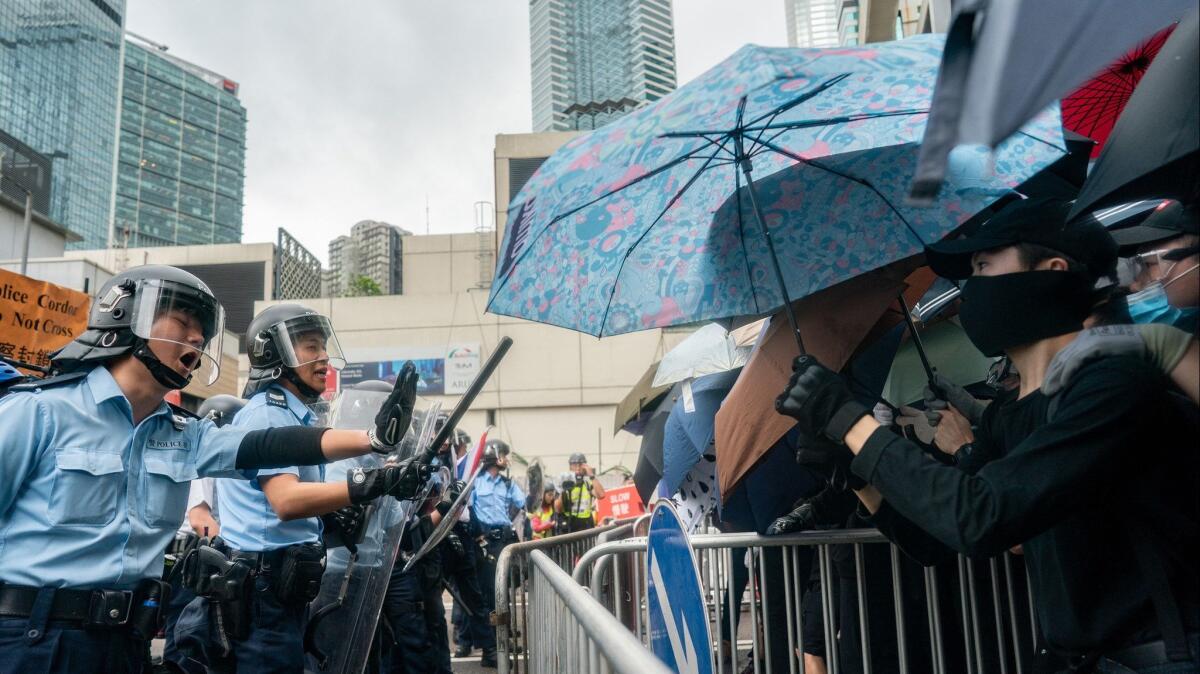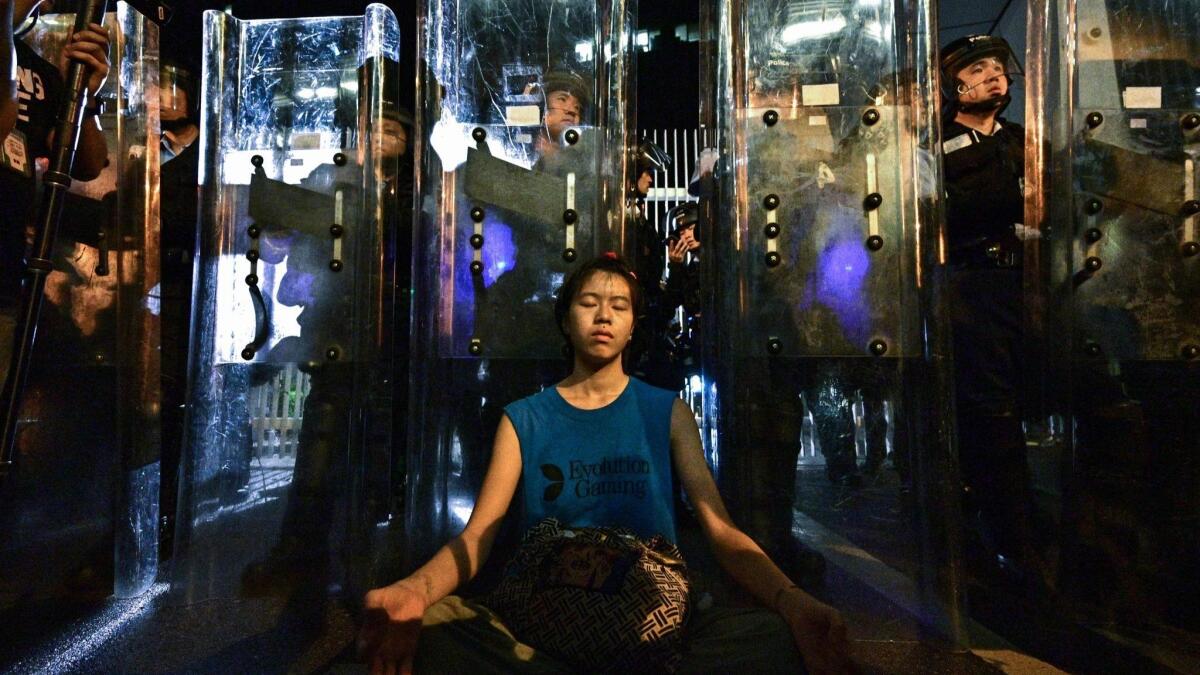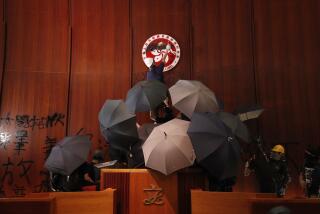Many fear that Hong Kong’s ‘last battle’ is already lost

They are calling it Hong Kong’s “last battle” — a David-versus-Goliath struggle to prevent China from encroaching on the city’s freedoms and autonomy. But with China’s increasingly assertive approach to Hong Kong, the battle may already be lost.
Hundreds of demonstrators gathered late Tuesday in a last-ditch effort to stave off a bill that would allow criminal defendants to be extradited from Hong Kong to mainland China. Soft strains of “Sing Hallelujah to the Lord” washed over police guarding Hong Kong’s legislative complex with riot shields and metal barriers.
By Wednesday morning, a larger crowd flooded into the streets, blocking access to the central government building, in a fashion reminiscent of the pro-democracy Umbrella Movement in 2014.
But many saw passage of the bill as a foregone conclusion, part of a steady erosion of the special status that set the former British colony apart from the rest of the People’s Republic.
“There’s a sense of pessimism here,” Joseph Cheng Yu-shek, a pro-democracy activist and former chair of the political science department at City University of Hong Kong, said in an interview. “I think the vast majority of people here knew that even if we marched and even if there was a big turnout, we probably would not be able to change the decision of the government and the decision of Beijing.”

At stake is Hong Kong’s future as a global financial center and base for multinational corporate entities with business in China and elsewhere in Asia. The American Chamber of Commerce in Hong Kong recently expressed opposition to the government’s determination to rush the bill through parliament, adding that it put at risk Hong Kong’s reputation for rule of law.
The new bill raises fears that Hong Kong citizens, foreigners living in Hong Kong and even people passing through Hong Kong’s airport could be arrested and sent to mainland China, where, critics say, the legal system fails to guarantee a fair trial.
Hong Kong Chief Executive Carrie Lam — who last year told a journalist that her favorite politician was Chinese President Xi Jinping — insists the bill will go ahead, despite a mass protest Sunday that organizers said drew more than a million people. Authorities estimated the number to be a quarter of that.
Any reversal would not only humiliate Lam, but also would embarrass Chinese authorities, making a backdown unlikely, according to analysts and pro-democracy activists.
“This is what Hongkongers are against, a tone-deaf leader who turns a blind eye to the people’s voices, who pushes ahead robotically and stubbornly at all consequences,” tweeted Hong Kong singer and actress Denise Ho.
Critics say Xi’s term as China’s leader since 2012 has seen a steady whittling away of freedoms that Beijing promised before Hong Kong’s handover from British rule to China in 1997, as he has also tightened controls on activists and clamped down on dissent on the mainland. They say this has eroded the credibility of China’s “one country, two systems” policy, which is supposed to allow Hong Kong its own autonomous administrative, legal and economic system.
The bill is likely to be finalized within weeks. Businesses across the city were planning to strike Wednesday, when the bill was to be debated in the Legislative Council, where about half the members are popularly elected.
Demonstrators began gathering late Tuesday night, and umbrellas popped open at midnight as rain began to fall. In one corner overlooking Hong Kong’s famous harbor skyline, 28-year-old Quincy crouched under her umbrella, huddled with a group of Catholic university students. She asked not to use her last name because she works in Beijing and fears repercussions.
“I understand what Hong Kong will become because I personally know what is happening in China. We don’t have any way to change things, so we are just here to pray and hope,” she said, beginning to cry. “We hope the government can find some kindness deep down in their heart to change things.”
Lam told journalists Tuesday that the bill struck a balance in terms of protecting human rights, addressing public concerns and ensuring Hong Kong did not become a haven for fugitives.
The last time so many Hong Kong residents turned out in protest — in 2003, marching against a national security law — authorities praised citizens for pointing out the problems with the law and dropped it. That Lam has refused to budge on the extradition measure conveys how far Hong Kong has shifted into Beijing’s orbit in recent years.
“I think we’ve seen in the last few years a desire from Beijing and the Hong Kong government to crush political opposition and to remove avenues to continue opposing the government and also to really push the integration of Hong Kong into the rest of mainland China on an economic basis,” Ben Bland, Hong Kong analyst at the Lowy Institute think tank in Sydney, Australia, said in an interview.
Many countries, including the U.S., do not allow extradition to China because its legal system, which is under Communist Party control and has a conviction rate of more than 99%, lacks ordinary legal protections designed to guarantee a fair trial. Human Rights Watch has reported torture and disappearances of suspects into detention centers for months without charge and no access to lawyers or family.
In one recent example, New Zealand’s Court of Appeal on Tuesday ruled against the extradition to China of Kyung Yup Kim, accused of murder by Chinese authorities, and called on the New Zealand government to reassess serious human rights concerns in China, including the right to a fair trial and the use of torture.
In recent years, Hong Kong authorities have disqualified pro-democracy candidates from running for parliament; jailed members of the pro-democracy Umbrella Movement; banned a pro-independence political party; and refused to renew the visa of a journalist who is vice president of the Foreign Correspondents’ Club after the club hosted an address by a pro-independence politician.
“Beijing’s assault on Hong Kong’s freedoms, particularly the rights to free expression, association and political participation, worsened considerably in 2018,” Human Rights Watch said in its 2019 World Report.
The battle over the extradition bill may bleed into global tensions over China’s rising geopolitical and strategic clout, which has erupted into a trade war. Tensions flared after Canada arrested Meng Wanzhou, an executive of the Chinese tech giant Huawei, on a U.S. extradition request. China responded with arrests of two Canadians, political analyst Michael Kovrig of the International Crisis Group and businessman Michael Spavor. Those were seen by Western diplomats as the kind of tit-for-tat abuses that could unfold in Hong Kong should the bill be passed.
Who is the man behind Huawei? »
“That’s exactly the kind of weaponization of the legal system that people are afraid of,” said Antony Dapiran, author of “City of Protest,” a book about dissent in Hong Kong. China sees Canada’s arrest of Meng as political and an abuse.
Kevin Yam, a Hong Kong-based lawyer and former coordinator of the Progressive Lawyers Group, said that, under the proposed law, Hong Kong courts would have limited scope to refuse extraditions.
“I think it’s one of those situations where the odds are heavily stacked against the protest movement succeeding,” he said.
Pro-democracy activist and politician Albert Ho of the Hong Kong Alliance in Support of Patriotic Democratic Movements in China said the Hong Kong government cared more about pleasing authorities in Beijing than about listening to anger in Hong Kong. He warned that Beijing’s increasing pressure on Hong Kong’s freedoms could undermine the territory’s vibrancy and turn it into just another ordinary Chinese city.
“We are heading toward that direction. Hong Kong is in a direct confrontation between the soft power of Hong Kong as a free city and the sharp power of Beijing,” Ho said.
“We are doing everything we can to stop or slow down the process. We have a dynamic civil society and a rich tradition of the rule of law, and people aspire to human rights and freedom. We will speak out and resist anything that seeks to erode our values,” he said.
Times staff writer Alice Su in Hong Kong contributed to this report.
More to Read
Start your day right
Sign up for Essential California for news, features and recommendations from the L.A. Times and beyond in your inbox six days a week.
You may occasionally receive promotional content from the Los Angeles Times.






